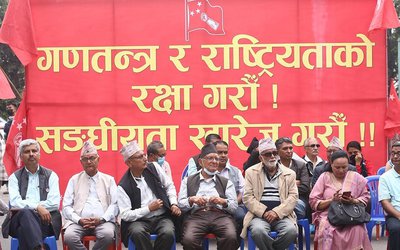More on News





The Embassy of Israel jointly with Sana KisanBikas Bank Ltd. in cooperation with Swachchhanda Small Farmer's Agricultural Cooperatives Ltd distributed 500 Persimmon Fruit trees at a community in Chitlang VDC, Makwanpur, on 12 February 2014. Around 200 families benefitted from the distribution of trees.
Speaking during the distribution HananGoder, Ambassador of Israel to Nepal, said, "This community is strongly involved with Agricultural and Ecological projects. And we are proud to be associated with these endeavors".
Jalan Kumar Sharma, CEO, Sana KisanBikas Bank Ltd, who has been working closely with this community said, "Every person is involved in social works in one way or another. Sana KisanBikas Bank is ever ready to be involved in such works and is very proud to be in association with the Embassy of Israel in Nepal for the distribution of persimmon fruit plants to this VDC, which will help to enhance the living of the people in this community".
These plants that grow at a maximum height of seven to eight feet are expected to bear fruits within a year of plantation. A grown up mature tree can bear at an average of 20-30 kg fruit in a year. This small initiative is intended to help the community to benefit economically and improve the quality of life.
Compared to apples, persimmons have higher level of dietary fiber, sodium, potassium, magnesium, calcium, iron, manganese and are rich in vitamin C. These fruits contain phytochemicals, which are under preliminary research for potential anti-cancer activity.
They grow swiftly, and are resilient to the stresses of unpredictable climates. Persimmons can tolerate and adapt to a wide range of climates. Persimmons are also known for their resistance to diseases and pests. They are one of the last trees to leaf out in the spring, and do not flower until well after the leaves have formed, bypassing the threat of blossom loss to frosts. The fruit hangs on the branches long into the winter. Because they grow swiftly and colonize off their root systems, they are ideal for helping recover habitat.
A persimmon tree will be mature enough to bear fruit within 7–8 years. They hold their own against flooding riverbanks quite well.







